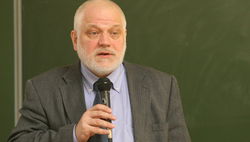Alexei Lvovich Semenov, member of the Russian Academy of Sciences and the Russian Academy of Education, Doctor of Physical and Mathematical Sciences, professor, Moscow Institute of Open Education, rector.
Semenov: math education may become an advantage of the Russian Federation.
One of the conferences of the international forum “Eurasian Educational Dialogue” to be held on April 17-19, 2013 in Yaroslavl will be dedicated to math education. The draft of Mathematical Education Concept, elaborated by a group of experts in accordance with the President’s executive order, is planned to be discussed within the forum’s framework.

- Alexei Lvovich, why has precisely mathematical education been mentioned in the President’s executive order?
- Mathematical education may become a part of our national idea, a specific advantage of the country. It would be rather silly to think that we will be able to produce pots and LEDs cheaper than other countries, whereas a high mathematical culture is the basis for innovation, particularly in information technologies.
- Would it be correct to say that Russian mathematical education nowadays is in crisis?
- We can admit that there has been a decline in the level of math education in comparison to the 1950s-1970s.
One of the problems is the absence of goal-setting. The public doesn’t understand the purpose: why study math if it is believed that in the country there is not enough work for engineers? But in reality the demand for engineers is steadily growing.
Social problems of the 1990s have taken a serious toll on the quality of math education. That was the time when teachers were not properly and timely paid, and by far not the best graduates would choose this profession. The fact that mass school is still unable to adapt to social changes affects mathematics too.
- What levels of math education are being discussed in the draft of the Concept? Are we talking about training professional mathematicians or teaching math at school?
- The Concept dwells upon forming mathematical culture in general.
The most important common cross-cutting principle is building learning process upon activity: pupils should always be solving new problems and cases. For math students, these are research and exploratory cases, for future pedagogues – competition-based cases and their task to teach different pupils, for students-economists and engineers – problems and cases in applied fields. Those who teach them must be professionals, capable of solving all the mentioned problems, have pedagogical skills, and be ready to learn throughout life.
It all starts with “preschool mathematics”: mathematical and logical concepts as well as activity models, formed at an early age, have basically nothing to do with arithmetic. Visual, materialized environment of mathematical and computer science objects will play a big role in the elementary school. Thus children will be able to discover properties and laws of those objects by themselves. In the middle school, the importance of real mathematics and data analysis will be growing.
- What other changes is math education at school going to face?
- We believe that each and every student should be moving along “the corridor of proximal development” constantly solving new and difficult but feasible problems. His/her individual progress and difficulties will be automatically recorded in the informational environment and taken into teacher’s consideration. Independent logical reasoning, applied also outside mathematical science, mathematical proofs, building mathematical models and correlating modeling results with reality must play the most significant role in the content of education. Computer mathematical tools will be utilized to the full extent. Nobody is going to abolish multiplication table, but the logic of reasoning and the ability to apply mathematics should have equal rights with the ability to calculate. Computers will help children with the latter.
Within the framework of the Concept’s realization much support will be given to leading mathematical schools and pedagogues.
There is no doubt, that all these changes will be discussed with the teachers in advance, and the former will be taking place gradually.
- One of the recent changes is the open bank of assignments for math Unified State Exam. What do you think of its efficiency?
- Owing to the open bank of assignments, teachers, parents and pupils know that solving vital problems guarantees passing the threshold of the USE and, at the same time, the threshold of vital mathematical competence. If a school-leaver is able to solve a rate-time-distance problem, choose the most convenient cell phone plan and if he/she can understand what is shown on the temperature or price graph, then he/she has learned mathematics at a level that is necessary for everyone.
One of complaints about the open bank of assignments is that nowadays learning math is substituted for preparing for the Unified State Exam. It’s not true. Visa versa, when an individual is getting ready for the exam using materials from the bank, he/she is actually learning math including new elements and aspects which earlier might have been left behind.
- What are you expecting from the discussion of the Concept’s draft at the conference in Yaroslavl?
This will be the first time when the Concept will be presented at such a grand-scale forum. I hope that our discussion will be fruitful and will draw our colleagues’ attention.



